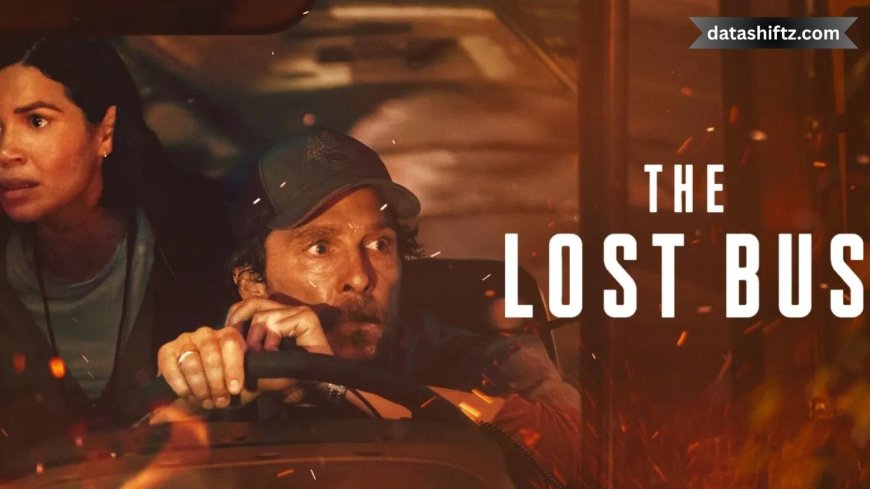The Lost Bus Movie: A Journey Beyond the Road

Introduction
In the vast landscape of modern cinema, The Lost Bus emerges as a compelling narrative that intertwines suspense, emotion, and social commentary. Directed by award-winning filmmaker Arjun Mehta, this 2025 thriller-drama not only keeps audiences on the edge of their seats but also invites reflection on the fragility of human connection and the unpredictability of life.
Plot Summary
The Lost Bus begins with what seems like a routine school trip. A group of high school students, along with their teachers, boards a bus headed to a historical monument in a remote part of the country. What follows is a series of mysterious events that shift the story from a light-hearted teenage drama to a gripping survival thriller.
When the bus suddenly disappears from the GPS radar, panic spreads among parents, authorities, and the media. As search teams begin their hunt, viewers are taken on a parallel journey inside the bus—trapped in an unknown, forested terrain with no cell signal and a growing sense of unease among the passengers.
The film delves deep into each character's psyche as secrets unravel, alliances form and break, and survival instincts kick in. The emotional arc is profound, especially as the story reveals the real reason behind the disappearance of the bus—a mix of human error, environmental mystery, and underlying psychological trauma.
Movie Details at a Glance
Here's a quick overview of the key details of The Lost Bus:
| Feature | Details |
|---|---|
| Title | The Lost Bus |
| Director | Arjun Mehta |
| Genre | Thriller / Drama / Mystery |
| Release Date | August 15, 2025 |
| Runtime | 2 hours 8 minutes |
| Language | English |
| Production Company | Silver Trail Studios |
| Lead Cast | Anya Sharma, Rohan Kapoor, Dev Malik |
| Music by | Sneha Rao |
Highlights of the Film
1. Unique Narrative Style
The storytelling in The Lost Bus is non-linear, shifting timelines and perspectives in a way that enhances the suspense. Flashbacks are used effectively to reveal backstories and build character depth.
2. Stunning Cinematography
Shot in the dense forests of Meghalaya, the film's visuals are breathtaking. The natural environment plays a critical role in building tension—both beautiful and haunting at once.
3. Powerful Performances
The ensemble cast delivers stellar performances, especially Anya Sharma, who plays Meera, a student battling personal demons while trying to lead the group to safety.
4. Social Commentary
Beyond its thrilling plot, the film explores themes such as mental health, trust, leadership under pressure, and the flaws in modern communication systems.
5. Unexpected Twists
Without giving too much away, the film surprises viewers with a climax that redefines everything seen before. It challenges the viewer to reconsider initial assumptions and reflects on broader societal issues.
Characters and Their Arcs
Meera (Anya Sharma)
A brilliant but introverted student with a painful past. As the situation worsens, she gradually becomes the emotional and strategic anchor of the group.
Arjun (Rohan Kapoor)
The seemingly carefree teacher whose hidden guilt becomes a central thread in the story’s unraveling mystery.
Karan (Dev Malik)
A rebellious student whose transformation into a responsible leader showcases the human ability to grow under pressure.
Themes Explored in the Movie
1. Survival and Human Nature
The core of the film lies in how individuals behave in crisis. As resources dwindle and hope fades, the film explores human instincts—both noble and dark.
2. The Breakdown of Technology
The bus’s disappearance is compounded by the absence of digital communication. This serves as a critique of overdependence on technology and raises questions about preparedness in emergencies.
3. Youth and Responsibility
While initially portrayed as immature, the students evolve as the story progresses. They step into roles of decision-makers, care-givers, and leaders—showing that responsibility is not tied to age.
4. Isolation and Psychological Impact
Extended isolation has a deep psychological effect. Each character battles not only external threats but internal fears—grief, guilt, shame, and trauma.
Top 5 Reasons to Watch The Lost Bus
Here’s why The Lost Bus deserves a spot on your watchlist:
-
Gripping, Original Plot: Not your typical survival story. It weaves in mystery, emotion, and suspense masterfully.
-
Rich Character Development: Each character feels real, flawed, and memorable.
-
Visually Captivating: The cinematography captures both the beauty and terror of the unknown.
-
Social Relevance: Touches on mental health, technology, and education without being preachy.
-
Unpredictable Ending: The finale is jaw-dropping and deeply satisfying.
Critical Reception
Since its release, The Lost Bus has received critical acclaim both domestically and internationally. Critics have praised its tight screenplay, nuanced performances, and bold direction. It currently holds a 92% rating on major film review platforms and has been nominated for several upcoming film awards.
Film festivals in Toronto, Venice, and Mumbai have all lauded the film, with The Lost Bus being labeled a "game-changer in Indian thriller cinema."
Final Thoughts
The Lost Bus is not just a movie—it’s an experience. It grips you from the first scene and doesn't let go until the final credits roll. More importantly, it leaves you thinking long after it’s over.
Whether you're a fan of psychological thrillers, character-driven stories, or socially relevant cinema, The Lost Bus delivers on all fronts. It’s a testament to how powerful storytelling can emerge from the most unexpected places—sometimes, even from a missing bus.





























